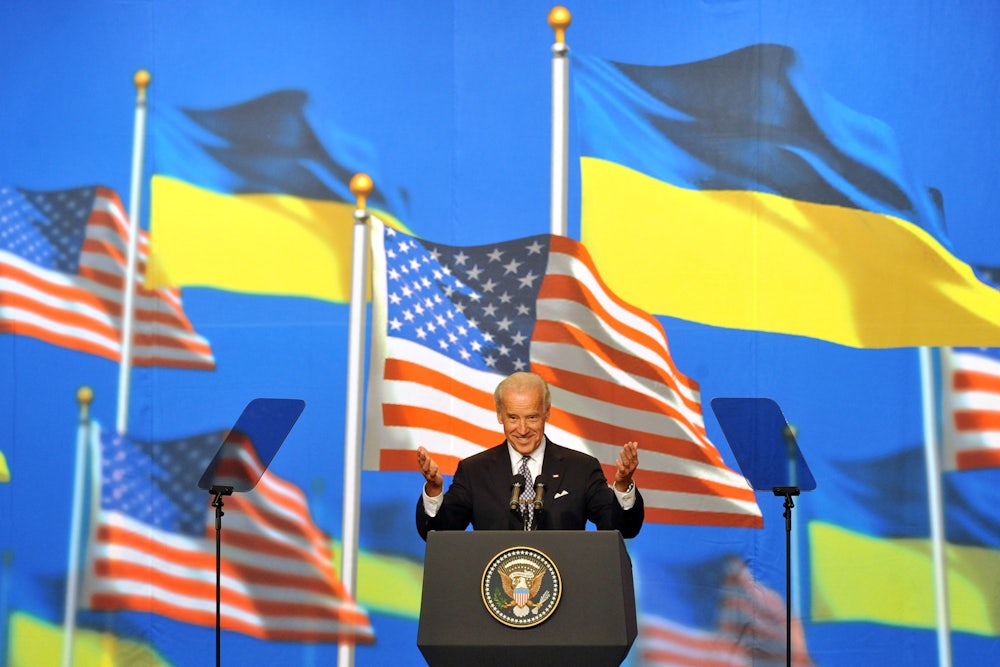When Russia invaded Ukraine in 2014, then–Vice President Joe Biden had some guidance for his boss. Make Russia “pay in blood and money,” he advised, suggesting that the United States deliver anti-tank missiles to Kyiv. President Barack Obama rejected the instruction, later explaining to a journalist, “The fact is that Ukraine, which is a non-NATO country, is going to be vulnerable to military domination by Russia no matter what we do.”
Today, many in the U.S. foreign policy establishment are warning that if Russia again attacks its western neighbor with the approximately 100,000 troops it has gathered at the border, Biden must respond forcefully—lest the entire region fall to Russia and dictators around the world be emboldened. This commentary—largely coming from the center rightward, ahead of a series of meetings this week involving senior U.S., Russian, and NATO officials—is not only strategically misguided but amounts to a worrying call to arms that few Americans have the stomach for.
“Biden’s Stand on Ukraine Is a Wider Test of U.S. Credibility Abroad,” declared The New York Times in a recent news analysis. “If the United States says, ‘Don’t do this, you will regret it, there will be very serious costs,’ and the Russians do it anyway, it does raise questions about America’s ability to achieve outcomes, at least in the Russian immediate periphery,” Richard Fontaine, chief executive of the Center for a New American Security, told reporter Michael Crowley.
Frederick Kagan, a resident scholar at the American Enterprise Institute (and whose bio tellingly states that he was “an architect of the surge military strategy in Iraq”), goes further, arguing that not only would Putin go on a rampage unlike anything seen since World War II, but China’s Xi Jinping might be inspired to take Taiwan. “With a Russian takeover of Ukraine,” he wrote in The Hill last month, “the re-emergence of a serious Russian conventional threat on the Polish and Romanian borders would … transform the Black Sea into a Russian lake, increasing pressure on Turkey.… And it would send a devastating signal to China and other predators about Western weakness, especially after America’s ignominious retreat from Afghanistan.”
Some claim this is a matter of defending or advancing democracy. For AEI senior fellow Michael Continetti, it’s also an opportunity to advocate for a bigger defense budget, more drone sales, and building liquefied natural gas plants in Northern and Eastern Europe. For others, the hyperbole knows no bounds. Gordon G. Chang, a senior fellow at the Gatestone Institute, makes the case for giving Taiwan nuclear bombs.
But David T. Pyne, the deputy director of national operations at a private organization called the Electromagnetic Pulse Task Force on National and Homeland Security, impressively outdoes them all: “The United States is quite possibly facing the most dangerous threat to its existence in its history right now,” he told Newsweek last month. If the U.S. doesn’t play its cards right, he added, we could see the “outbreak of a major war with Russia and China, which could provoke an existential threat against the U.S. homeland, which could end our nation and kill tens of millions of Americans.”
As Ukraine goes, so goes America?
Ukraine follows in a lengthy line of distant places that are said to be fulcrums on which global safety depends. Other entries include Vietnam, Cuba, Berlin, Central America, Iraq (in 1990 and in 2002), and Cuba again. Russia and China were said to be bolstered by last year’s pullout in Afghanistan. Is Ukraine another instance of hawks exaggerating the threat posed by a faraway conflict, or could an invasion there actually lead to a chain reaction of similar interventions around the world?
Political scientists and historians sometimes speak about “waves,” where ideas or social or political phenomena cross borders. Eric Hobsbawm coined the phrase “the Age of Revolution” to describe the political upheavals in North America and Europe from the late eighteenth to the mid-nineteenth century, including the “revolutionary wave of 1830.” Samuel Huntington popularized the concept of democratic waves, spurts of expansions in the number of democratic states. David Rapoport suggested that terrorism evolved in similar waves, starting with anarchists in the 1880s and leading to present-day religious-based terrorism.
But the notion that a menacing development in one country can cause parallel events in other countries has a different pedigree in Washington. Most famously, it served as the basis for the domino theory, which held that, as Dwight Eisenhower explained it in 1954 regarding communism in Indochina, “You have a row of dominoes set up, you knock over the first one, and what will happen to the last one is the certainty that it will go over very quickly.”
Eisenhower’s theory was notable for being inflexible—notice his certainty that a Communist regime ascending to power in one country would precipitate identical events nearby. Neighboring countries were assumed to have no countervailing traditions, interests, culture, or institutions to resist communism. This hypothesis led the U.S. to spend an estimated $738 billion (in 2011 dollars) and cause the death of millions of Vietnamese to preserve an anti-Communist regime in South Vietnam. But when North Vietnam eventually overran the South in 1975, and the country became one Marxist state, it had far less impact than American policymakers predicted. More broadly, in employing the domino theory, U.S. leaders had acted as though Southeast Asia was composed of vital dominoes in the Cold War. And yet Vietnam is still led by a Communist government, while the Soviet Union is long gone.
Ukraine is not Vietnam, and the frosty U.S.-Russian relations are nowhere near Cold War levels. Some experts believe that Russia has no intention of invading its neighbor, despite the military buildup at the border. “I think this is happening mostly because Vladmir Putin is worried about his domestic standing,” says George Washington University’s Robert Orttung, who has authored or edited several books on Russia and Ukraine. Putin wants to gain concessions from the West to distract from his failings at home, Orttung believes. A war with Ukraine would be bloody and deeply unpopular, he argues. Polls suggest that Russians don’t want to fight a war, and God knows Americans don’t.
Others aren’t so sure that an invasion won’t be forthcoming. “I think reasonable people would have to say that we don’t know,” says Paul D’Anieri, a Ukraine expert at the University of California, Riverside. Putin has multiple reasons for his recent threats, D’Anieri suggests. In addition to domestic concerns and wanting to improve Russia’s international position, “Putin, like many Russians, finds it difficult to see Ukraine as a separate country.” History—and historical mythology—leads people like Putin to believe that Ukraine, a former Soviet state, has been unjustly severed from Russia.
If Russia does act on its threats and send troops into Ukraine, analysts say that Biden would have to answer with some actions, and indeed he has promised to, telling Putin that the U.S. would “respond decisively.” But it’s not clear what, if any, ramifications the U.S. response would have for other contested areas around the world. “The analogy between Ukraine and Taiwan works only so far, in general terms,” says Eugene Rumer, director of the Russia and Eurasia program at the Carnegie Endowment for International Peace.
For one thing, the U.S. has made security guarantees to Taiwan and NATO members like Poland, which it is obliged to uphold. For another, the U.S.-Taiwanese relationship stretches back decades, with American troops being stationed in the country as early as the Korean War. “The U.S. has a much larger, more substantial commitment in Taiwan. What it has been doing for decades, supplying hardware, is just totally different,” says D’Anieri.
But can leaders in China and elsewhere be counted on to observe such distinctions? “We would lose a lot of credibility” if we didn’t answer Russian belligerence with a forceful reaction, according to Orttung. “The Chinese are looking at that.” Especially coming so soon after the U.S. chaotically withdrew from Afghanistan, some observers believe that any perception of American weakness would serve as a license to other would-be aggressors.
This perspective differs from the domino theory in that it doesn’t presume states in a specific region will all share the same fate automatically. However, it does reduce the complex decisions to go to war made by leaders in China, Russia, and elsewhere to a matter of American resolve. History, military and economics capabilities, national interests, domestic issues—all are seen as subordinate to assessments of the will of the U.S. “We shouldn’t exaggerate the direct implications [of the situation in Ukraine] for Taiwain,” says D’Anieri. “Leaders around the world are smart enough to know that” the situations are different.
Given that America has special responsibilities to allies to which is has provided security guarantees, it would be prudent to limit the list of those first-tier allies. Some pundits and policymakers suggest that if Ukraine were to join NATO, Russia would know better than to act against it. But this theory could prove disastrously wrong, obligating America to go to war for a country that is unimportant to its security. Indeed, by saying that the U.S. has an “ironclad commitment to Ukraine,” policymakers have already overpromised: There is no prospect of American troops being deployed in Eastern Europe.
As Rand Corporation’s Samuel Charap put it to Foreign Policy, “The rhetoric is writing checks that in reality our policy can’t cash.” When adversaries call America’s bluff and intervene in countries that leaders have cavalierly promised to protect, the country loses prestige as much as it does in any withdrawal or retreat. Says Rumer: “It’s unhelpful to your reputation to promise so much in so many places and not deliver.” Instead of insisting on keeping unwise pledges, perhaps the U.S. should be more careful about making such pledges in the first place.






